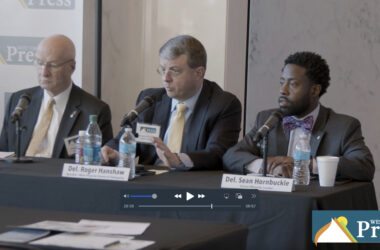CHARLESTON, W.Va. — Republican gubernatorial candidate Bill Cole supports getting rid of the statewide, end-of-year Smarter Balanced math and English language arts standardized tests.
But Cole feels West Virginia’s current education standards — learning requirements that the test is supposed to measure how well students have learned — “measure up pretty good” to standards in other states. That positive reception of the state’s standards seems to conflict with the position he states on his own website, which pledges to “end Common Core.”
Unlike Cole, Democratic candidate Jim Justice didn’t grant the Gazette-Mail a phone interview late last week or over the weekend concerning his education proposals. He didn’t specifically state whether he wants to dump Smarter Balanced in an email response to questions his campaign spokesman asked a reporter to send.
Both candidates seemed unfamiliar with what federal law actually requires of states regarding standardized tests.
Smarter Balanced tests are aligned to the Common Core standards that have attracted controversy in West Virginia, though politicians have provided nearly no specifics about what they find wrong with the standards, aside from their association with the Obama administration.
The tests themselves are seen as harder than West Virginia’s old, custom standardized tests, and high school students are spending much less time on them than they’re projected to need. Cole said kids have no reward for doing well on the tests.
Justice wrote that “I believe we are testing our kids to death,” that “Teachers and parents are concerned that we aren’t making the test more meaningful to the students,” and that “One idea is to replace the Smarter Balance [sic] test with the ACT.”
He’s previously said he’d favor having high school students take the ACT as a standardized test, but grades three through eight are also currently given Smarter Balanced tests.
Like Cole, Justice seemed to be OK with the state’s current standards.
“It’s not right to keep changing the goalposts on the kids,” Justice wrote when asked if he’d favor changing the standards. “Our educators are asking for consistency.”
Cole said he’d support a bill to replace Smarter Balanced with end-of-course exams — state Schools Superintendent Michael Martirano has expressed some support for this, at least in high school — and thinks the state should also look at the Iowa Test of Basic Skills.
He also supported a bill earlier this year to replace Smarter Balanced with a series of tests developed by ACT for non-high-school grades that are supposed to prepare students for the regular ACT that many colleges accept as an entrance exam. Democratic Gov. Earl Ray Tomblin vetoed the bill after its passage.
Cole said he wants stakeholders, including educators and parents, to provide input on what specific changes should be made to testing and to improve education as a whole. But he also stressed that it’s important that the test aligns with what’s taught in West Virginia schools.
Hesitancy to change standards
Smarter Balanced tests were built to align to the national Common Core math and English standards — and they’re better aligned, according to some studies, than ACT’s tests. The Mountain State’s standards are largely identical to the Common Core standards, and state Department of Education spokeswoman Jessica Hall said the Center on Standards and Assessment Implementation is now reviewing the state’s modifications to the standards to see whether changes need to be made to Smarter Balanced.
When asked if he wants to change the state’s current standards, Cole said he thinks “standards-wise, we measure up pretty good” to other states, and said he wants to be careful with changing too many things.
Cole’s education proposals section on his website states he will “end Common Core and have state educators, parents, business leaders and higher education leaders create West Virginia College and Career Ready Standards. The state will responsibly end its participation in the Smarter Balanced test and establish a West Virginia based test that is rigorous and based on local standards. The new system will be adopted with full transparency and will not be Common Core by another name.”
The state Board of Education has actually renamed its largely Common Core standards, following lawmakers’ attempts to repeal them and a review that concluded teachers largely support Common Core, as “West Virginia College- and Career-Readiness Standards.”
In explaining to the Gazette-Mail what exactly he opposes, Cole said he has a broader definition of Common Core than just standards.
“I really look at Common Core as the federalization of our schools,” he said. “And what I advocate is basically kicking the federal government out of classrooms.”
Instead of criticizing the state’s current standards, Cole used an argument Justice used in his email and state education officials have also often employed when defending the standards: Cole said sought to draw a distinction between the standards for what students are supposed to learn and the curriculum, which is how teachers actually teach. Cole said “the work that needs to be done is more within the curriculum.”
Could next governor even make changes?
Before Tomblin vetoed it, state legislation passed earlier this year to dump Smarter Balanced and replace it with a suite of ACT-developed tests received, in its final form, support from 99 out of the 100 delegates. (Lynne Arvon, R-Raleigh, didn’t vote). It also had support from 27 out of 34 senators — four voted nay and three were absent.
But some have questioned whether the Legislature and the governor could change the standardized test, and several related education matters, without an amendment to West Virginia’s constitution. Such amendments have a higher bar for passage than mere state laws; they need the support of two thirds of the lawmakers elected to both houses and then must be approved directly by a majority of voters.
“The general supervision of the free schools of the State shall be vested in the West Virginia board of education which shall perform such duties as may be prescribed by law,” the constitution states. The state school board — whose members are appointed by governors to nine-year terms, a length also enshrined in the constitution and that both Cole and Justice say is too long — has strongly publicly opposed lawmakers’ past efforts to get rid of Smarter Balanced.
“That’s not something we are prepared to comment on at this time,” state board attorney Mary Catherine Tuckwiller said Friday when asked whether the state board believes that, even if the Legislature managed to pass a law changing the test, that law would be deemed unconstitutional.
Cole, R-Mercer, the president of the GOP-controlled Legislature for the past two years, said he doesn’t think changing the test would require a constitutional amendment.
“Constitutionally, we have to provide a thorough and efficient education system to our children,” he said. The constitution says the “Legislature shall provide, by general law, for a thorough and efficient system of free schools.”
“The state board is constitutionally charged with these policies,” Justice wrote about the standards, Smarter Balanced and the upcoming system to give entire schools A-F grades largely based on Smarter Balanced scores. He wrote that “Any questions about a constitutional amendment are premature at this point” but in the next sentence said: “I would entertain any possibility to make education an economic driver and our centerpiece.”
Cole criticized standardized tests for what he called trying to standardize kids, saying no two children are alike, and said states and, moreover, local institutions know what’s best for them.
“The issues that a McDowell County or a Fayette County face are entirely different than what Monongalia or Jefferson County may be facing,” he said.
When asked Friday about the federal standardized testing requirements, Cole didn’t know the grades for which federal law requires annual standardized testing. He thought the requirements were for grades eight through 12.
Justice also got it wrong in his emailed response, sent by campaign spokesman Grant Herring. In criticizing the state for testing “far beyond the federal requirements” he said the state “is testing all grades from 3-11, while the federal government requires one test in elementary school, one in middle school, and one in high school.”
The federal government actually requires annual standardized testing in math and English language arts in grades three through eight and once in high school, while for science, it requires only one tested grade in elementary school, one in middle school and one in high school. West Virginia does currently go beyond federal requirements by requiring three tested high school grades for math and English, while it tests the minimum number of grades in science, for which the state doesn’t use Smarter Balanced tests.
Cole said the federal government hasn’t followed through with holding back federal dollars as a penalty for states who don’t comply with the testing rules.
“Several states have pushed back and they didn’t lose their federal funding,” Cole said.
A-F grading system
Next month, the state plans to debut its new accountability system that gives A-F grades to entire schools, an idea Tomblin advocated, and one that could be undercut by another standardized test change. Students’ overall scores and increases or decreases in their scores on Smarter Balanced, given each spring, are planned to be the primary factors in what grades schools receive, though Smarter Balanced will have a lesser impact on the grades high schools receive.
On Wednesday or Thursday this week, the state school board plans to vote on setting total point values, called cut scores, for determining the grades. The board’s meeting agenda also includes a vote on whether to waive parts of a related policy in order to “defer for one year certain criteria for school system approval status,” but the agenda doesn’t specify the criteria and department officials didn’t provide more detail Friday about the waiver’s purpose.
He also said he’s “cautiously optimistic” about giving entire schools A-F grades, though when asked whether he’d change anything about how those grades are calculated, including the large portion that’s based on students’ standardized test scores, he said he’d have to see the system in action before taking a position.
He did note it’s hard to compare high-poverty and low-poverty schools. Researchers have said socioeconomic status is the single biggest factor in test scores.
“Too often, again, we’re trying to compare a school that’s perhaps in a very rural, impoverished community to one that’s in a wealthier, affluent community,” he said, “and again, it’s not an apples to apples comparison.”
When asked about his position on A-F, Justice wrote that he’s heard concerns from educators that it “isn’t getting the job done in other states.”
Reach Ryan Quinn at [email protected], facebook.com/ryanedwinquinn, 304-348-1254 or follow @RyanEQuinn on Twitter.




